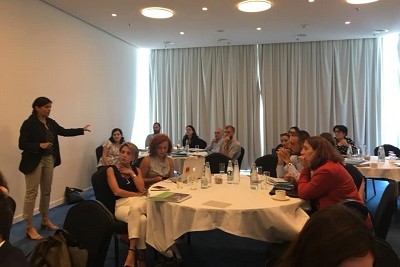Sensitizing Georgian and Armenian partners on gender-responsive economic policies
Date:
To build awareness around the nexus of gender and economics and to understand the importance of gender-responsive economic policy, UN Women organized a five-day training on gender and economics in Kakheti, Georgia.

The five-day training was attended by representatives of different government agencies, civil society organizations (CSOs) and academic institutions, as well as the Georgian Trade Unions Confederation and the Georgian Employers Association. The participants gained insights on different theoretical approaches and practices around gender and economics, including topics related to unpaid care work, decent work and social protection as well as income inequality and poverty through a gender lens.
“Before the training, I believed that we were implementing gender-neutral policies and programmes, but now I understand that there are no gender-neutral policies. By not taking gender aspects into consideration, we are risking excluding the needs and experiences of the majority of the population – women,” remarked Marine Egutia from the Agricultural Projects Management Agency. “The training has provided me with highly informative insights and perspectives that I will start considering when designing programmes to make them more gender-aware.”
The gender and economics training was developed by UN Women in 2017 with the financial support of the Swiss Development Cooperation. The overall objective of the course is to strengthen the capacity of technical advisers and programme staff on the importance of gender-responsive economic policy.
In addition to the five-day course, UN Women organized a one-day high-level meeting (on 22 July) with the representatives of Georgia’s government, the private sector, CSOs and development partners to present and discuss some of the key issues and debates generated by the course. In her opening remarks, the Deputy Minister of Economy and Sustainable Development, Ekaterine Mikabadze, noted that “without providing equal opportunities to both men and women in the country, it is impossible to achieve inclusive growth. That is why we regard today’s topic of discussion as highly relevant.” The participants of the meeting agreed to follow-up on some of the key issues raised by the course (such as unpaid care work, parental leave regulations, a reduction in the gender pay gap and the accessibility of affordable and high-quality childcare services) through their daily work.
Both the course and the follow-up high-level meeting were supported by the “Women’s Economic Empowerment in the South Caucasus” project. The project is implemented with the financial support of the Swiss Development Cooperation and the Austrian Development Agency.